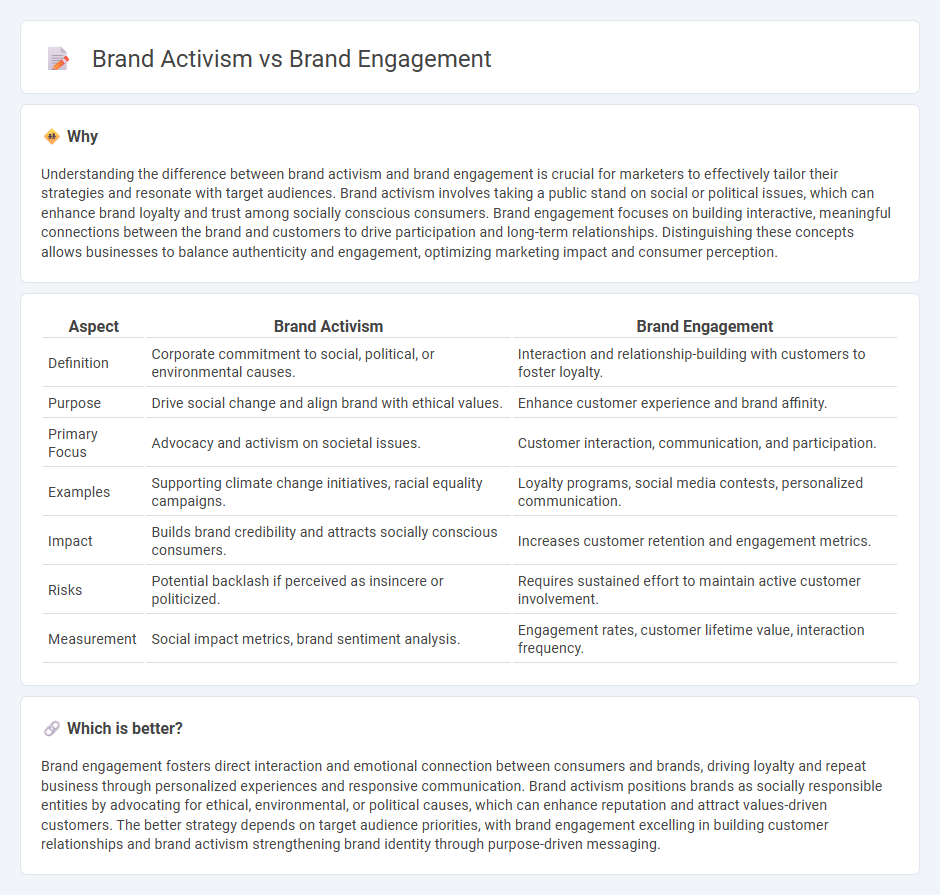
Brand activism involves companies taking a stand on social, environmental, or political issues to align with consumer values and drive social change. Brand engagement focuses on fostering meaningful interactions and emotional connections between a brand and its audience to build loyalty and trust. Explore how these strategies differ and complement each other to boost your marketing impact.
Why it is important
Understanding the difference between brand activism and brand engagement is crucial for marketers to effectively tailor their strategies and resonate with target audiences. Brand activism involves taking a public stand on social or political issues, which can enhance brand loyalty and trust among socially conscious consumers. Brand engagement focuses on building interactive, meaningful connections between the brand and customers to drive participation and long-term relationships. Distinguishing these concepts allows businesses to balance authenticity and engagement, optimizing marketing impact and consumer perception.
Comparison Table
| Aspect | Brand Activism | Brand Engagement |
|---|---|---|
| Definition | Corporate commitment to social, political, or environmental causes. | Interaction and relationship-building with customers to foster loyalty. |
| Purpose | Drive social change and align brand with ethical values. | Enhance customer experience and brand affinity. |
| Primary Focus | Advocacy and activism on societal issues. | Customer interaction, communication, and participation. |
| Examples | Supporting climate change initiatives, racial equality campaigns. | Loyalty programs, social media contests, personalized communication. |
| Impact | Builds brand credibility and attracts socially conscious consumers. | Increases customer retention and engagement metrics. |
| Risks | Potential backlash if perceived as insincere or politicized. | Requires sustained effort to maintain active customer involvement. |
| Measurement | Social impact metrics, brand sentiment analysis. | Engagement rates, customer lifetime value, interaction frequency. |
Which is better?
Brand engagement fosters direct interaction and emotional connection between consumers and brands, driving loyalty and repeat business through personalized experiences and responsive communication. Brand activism positions brands as socially responsible entities by advocating for ethical, environmental, or political causes, which can enhance reputation and attract values-driven customers. The better strategy depends on target audience priorities, with brand engagement excelling in building customer relationships and brand activism strengthening brand identity through purpose-driven messaging.
Connection
Brand activism and brand engagement are interconnected through their mutual focus on fostering authentic relationships between consumers and brands by promoting social and environmental causes that resonate with target audiences. Engaging customers through brand activism enhances loyalty and trust, as consumers increasingly support brands that reflect their values and demonstrate commitment to societal impact. This synergy drives deeper emotional connections, elevating brand relevance and encouraging active participation in brand communities.
Key Terms
Brand Engagement: Customer Interaction, Emotional Connection, Loyalty
Brand engagement centers on customer interaction through meaningful touchpoints that foster emotional connections and drive loyalty. By delivering personalized experiences and consistent communication, brands build trust and create lasting relationships with their audiences. Discover how strategic brand engagement can elevate customer retention and advocacy.
Brand Activism: Social Impact, Purpose-driven Marketing, Corporate Responsibility
Brand activism drives social impact by aligning corporate responsibility with purpose-driven marketing strategies that address pressing societal issues. Companies engaging in brand activism actively incorporate values such as environmental sustainability, social justice, and ethical governance into their core business practices to foster meaningful change. Explore how brand activism can elevate your organization's purpose and create lasting community impact.
Brand Engagement:
Brand engagement refers to the emotional connection and interaction between a brand and its consumers, fostering loyalty and advocacy through meaningful experiences and consistent communication. It encompasses activities that encourage customer participation, such as social media interactions, personalized marketing, and community building, driving higher brand loyalty and sales. Explore effective strategies to enhance brand engagement and create lasting consumer relationships.
Source and External Links
Brand engagement - Wikipedia - Brand engagement is the process of forming an emotional or rational attachment between a consumer and a brand, impacting brand attachment and positively influencing customer purchase intentions, with social media as a key tool for brand communication and promotion.
What Is Brand Engagement and Why Is it Important? - Qualtrics - Brand engagement is about creating an emotional connection with customers that drives active participation and loyalty, exemplified by Nike's successful campaigns increasing app usage, customer engagement, and revenue.
How To Increase Brand Engagement Across the Board - Shopify - Brand engagement focuses on creating positive emotional connections through personalized experiences, storytelling, and community involvement, which leads to stronger customer loyalty, advocacy, and long-term business success.
 dowidth.com
dowidth.com